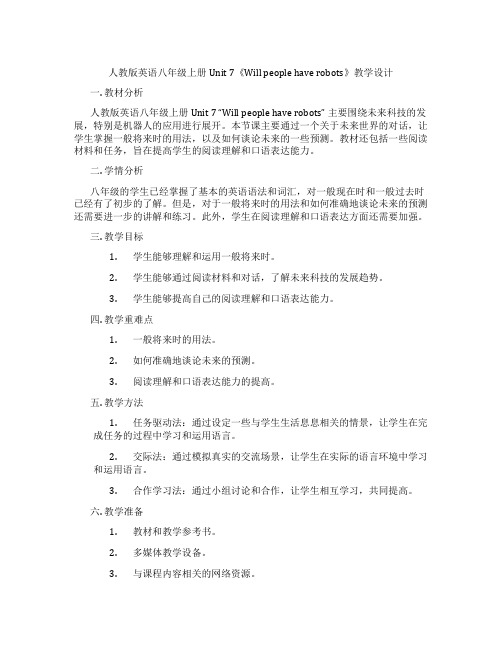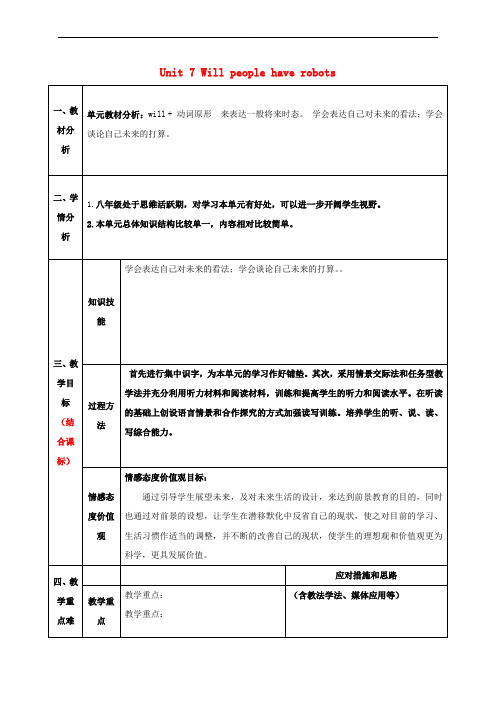人教版初中英语八年级上册《7Will people have robots》优质课公开课课件、教案
人教版英语八年级上册Unit 7《Will people have robots》教学设计

人教版英语八年级上册Unit 7《Will people have robots》教学设计一. 教材分析人教版英语八年级上册Unit 7 “Will people have robots” 主要围绕未来科技的发展,特别是机器人的应用进行展开。
本节课主要通过一个关于未来世界的对话,让学生掌握一般将来时的用法,以及如何谈论未来的一些预测。
教材还包括一些阅读材料和任务,旨在提高学生的阅读理解和口语表达能力。
二. 学情分析八年级的学生已经掌握了基本的英语语法和词汇,对一般现在时和一般过去时已经有了初步的了解。
但是,对于一般将来时的用法和如何准确地谈论未来的预测还需要进一步的讲解和练习。
此外,学生在阅读理解和口语表达方面还需要加强。
三. 教学目标1.学生能够理解和运用一般将来时。
2.学生能够通过阅读材料和对话,了解未来科技的发展趋势。
3.学生能够提高自己的阅读理解和口语表达能力。
四. 教学重难点1.一般将来时的用法。
2.如何准确地谈论未来的预测。
3.阅读理解和口语表达能力的提高。
五. 教学方法1.任务驱动法:通过设定一些与学生生活息息相关的情景,让学生在完成任务的过程中学习和运用语言。
2.交际法:通过模拟真实的交流场景,让学生在实际的语言环境中学习和运用语言。
3.合作学习法:通过小组讨论和合作,让学生相互学习,共同提高。
六. 教学准备1.教材和教学参考书。
2.多媒体教学设备。
3.与课程内容相关的网络资源。
七. 教学过程1.导入(5分钟)通过向学生展示一些机器人的图片,引起学生的兴趣,然后提问:“你们认为未来的人们会拥有机器人吗?”,让学生发表自己的看法。
2.呈现(10分钟)老师通过讲解和示范,向学生介绍一般将来时的用法,并举例说明如何准确地谈论未来的预测。
3.操练(10分钟)学生分组进行角色扮演,模拟真实的交流场景,运用一般将来时进行对话。
老师对学生的表现进行指导和评价。
4.巩固(10分钟)学生阅读教材中的阅读材料,理解并回答相关问题。
人教版英语八年级上册Unit7WillpeoplehaverobotsSectionB3a3c说课稿

1.知识与技能目标:
(1)学生能够掌握本节课的生词和短语,如robot, future, technology等。
(2)学生能够理解和运用一般将来时态,用will +动词原形描述未来机器人的应用。
(3)学生能够听懂有关未来机器人的对话,并能就课文内容进行简要概述。
2.过程与方法目标:
(1)通过听力训练,培养学生获取和处理信息的能力。
4.口语表达时,学生可能因为害羞或自信心不足而不愿意积极参与。
(三)学习动机
为了激发学生的学习兴趣和动机,我将采取以下策略或活动:
1.利用多媒体教学,展示未来机器人的图片和视频,引发学生的好奇心和兴趣。
2.设计互动性的小组活动,让学生在讨论和合作中学习,增加学习的趣味性。
3.创设情境,让学生模拟未来机器人的应用场景,提高口语表达的积极性。
人教版英语八年级上册Unit7WillpeoplehaverobotsSectionB3a3c说课稿
一、教材分析
(一)内容概述
本节课内容为人教版英语八年级上册Unit7 Will people have robots? Section B 3a-3c。该单元属于人教版英语八年级上册第四模块,主题为“未来科技与生活”,旨在让学生了解科技对未来生活的影响。本节课在单元中处于重要位置,主要围绕未来机器人的应用展开。主要知识点包括:
3.总结区:位于黑板右侧,用于总结本节课的主要内容和知识点,帮助学生回顾和巩固。
板书在教学过程中的作用是梳理和呈现知识点,帮助学生把握知识结构。为确保板书清晰简洁,我会在课前准备详细的板书计划,并在教学过程中注意板书的速度和布局,适时擦除不再需要的内容,保持黑板的整洁。
(二)教学反思
八年级英语上册-Unit-7-Will-people-have-robots备课教案-(新版)人教新

一、教材分析
单元教材分析:will + 动词原形 来表达一般将来时态。 学会表达自己对未来的看法;学会谈论自己未来的打算。
二、学情分析
1.八年级处于思维活跃期,对学习本单元有好处,可以进一步开阔学生视野。
2.本单元总体知识结构比较单一,内容相对比较简单。
教学重点:
教学重点:
1)学习掌握一般将来时态的意义和结构。
2) 掌握There be句型的一般将来时态的结构。
(含教法学法、媒体应用等)
教学难点
教学难点:
掌握more/fewer;more/less的用法。
情态动词will + 动词原形来表达一般将来时态。
(同属教学重难点的,在本栏书写)
五、课时安排
三、教学目标
(结合课标)
知识技能
学会表达自己对未来的看法;学会谈论自己未来的打算。。
过程方法
首先进行集中识字,为本单元的学习作好铺垫。其次,采用情景交际法和任务型教学法并充分利用听力材料和阅读材料,训练和提高学生的听力和阅读水平。在听读的基础上创设语言情景和合作探究的方式加强读写训练。培养学生的听、说、读、写综合能力。
Period 1 Se-2d 听说课
Period 3 Section A Grammar Focus-3c语法课
Period 4 Section B1a-1e 听说课
Period 5 Section B2a-2e 阅读课
Period 6 Section B3a-3c阅读课
Period 7 self check and unit review
六、知识结构
七、其它补充
情感态度价值观
2024年人教版八年级上册英语主题阅读Unit 7 Will people have robots?

Unit 7Will people have robots?Passage1(传统文化)中华传统文化, 博大精深!一起来感受吧!2023 is the Year of the Rabbit in China. Many people think this is a really good year. Why? Maybe it’s connected with the animal rabbit. What do people in different 1think about the animal? Let’s have a look.In Chinese people’s eyes, rabbits are quiet, gentle and smart. They are also very quick. A Chinese expression dongru tuotu is used to 2people who are smart and quick like a rabbit. * In a fairy story, there is a Jade Rabbit living on the 3. It’s the pet of Chang’e who is a goddess (女神)4known in China. This may explain 5rabbits are considered as a symbol of good luck.Also, in ancient China, the more children you had, the luckier and 6you would be. It made the rabbit a lucky sign as well because rabbits are full of 7and fertile (繁殖力强的) in nature.Similarly in the West, rabbits are well-known because they can 8in difficult and surprising conditions, with populations growing fast in a short time. Rabbits are also considered to be very 9in the West. They also think the rabbit’s foot is able to bring good luck.Another 10for good luck found in North America and the UK is to say the word “rabbit”on the first morning of every month.So, maybe the Year of the Rabbit can bring you some good luck, too.1. A. periods B. culturesC. brainsD. situations2. A. require B. check C. praise D. believe3. A. farm B. earth C. desert D. moon4. A. softly B. wisely C. widely D. silently5. A. why B. which C. when D. what6. A. happier B. smarterC. youngerD. noisier7. A. custom B. energy C. danger D. heat8. A. jump B. live C. climb D. dream9. A. moving B. curious C. lucky D. strange10. A. cause B. power C. voice D. traditionPassage2(文化习俗)骑着耕牛, 踏着立春的步伐, 唱着小燕子的歌谣, 来了解立春的文化习俗吧!Beginning of Spring comes. Everything turns green and becomes full of vigor. People can clearly notice that daytime becomes longer and the weather gets warmer. The traditional Chinese lunar calendar divides the year into 24 solar term. Beginning of Spring (立春) is the first solar term of the year. Here are some spring customs (习俗).Flying a kite. Spring is the best season for kite-flying.Erecting the egg (立鸡蛋). In China, it is said that the egg can be set upright on the first day of Beginning of Spring.Wearing fabric swallows (佩燕子). Wearing fabric swallows is a custom in some regions in Shanxi. The swallow is a harbinger of spring and a symbol of prosperity and happiness.Biting the spring. In many parts of China, people observe the custom of “biting the spring” on the first day of Beginning of Spring. They eat spring pancakes, spring rolls, or a few carrots.Making a Spring Ox. This custom in Shanxi is practiced right before Beginning of Spring. When spring comes, many people love spring and they do kinds of activities.Here is the survey about 200 people from different places who love customs.根据短文与图表内容, 选择最佳答案。
人教版八年级上册Unit7WillpeoplehaverobotsSectionB2b教学设计教案

4.教师展示与本节课相关的词汇和短语,如“robots”, “take over”, “perform”, “require”, “be necessary for”等,让学生初步了解并感知这些词汇的用法。
3.学生能够运用目标词汇和句型,描述未来机器人的功能、工作场景及对未来社会的影响。
4.学生能够理解并运用阅读策略,如预测、扫描、细读等,提高阅读理解能力。
(二)过程与方法
1.通过小组合作、讨论、分享等方式,培养学生合作学习和解决问题的能力。
2.通过阅读课文,引导学生运用预测、扫描、细读等阅读策略,提高阅读效率和理解能力。
2.教师对学生的练习成果进行现场批改和指导,帮助学生发现并改正错误。
(五)总结归纳
1.教师引导学生回顾本节课所学内容,总结一般将来时态和目标词汇的用法。
2.学生分享本节课的收获和感悟,以及在学习过程中遇到的困难和解决方法。
3.教师对学生的总结进行补充和归纳,强调重点,提醒学生加强课后复习。
4.教师布置课后作业,巩固本节课所学知识,为下一节课的学习做好准备。
提示:可以从以下几个方面展开:
a.机器人在未来的功能和应用领域。
b.机器人对人类社会的影响。
c.人们对机器人的态度和看法。
3.预习下一节课的内容,提前了解与未来科技相关的词汇和句型,为课堂学习做好准备。
4.搜集与未来科技相关的新闻或资料,下节课分享给同学们,共同探讨未来科技的发展趋势。
作业布置要求:
1.学生在完成作业时,注意语法和词汇的准确性,提高语言表达的流畅性和连贯性。
2.家长协助督促孩子完成作业,关注学习进度,鼓励孩子积极思考,发想象力。
Unit7WillpeoplehaverobotsSectionA1a2c课件人教版英语八年级上册

Task 3 Pairwork
A: Hello, XX. What’s your prediction about our life in 100 years? Will….?
in ten years
now
Presentation Let your imagine fly.
What will people’s daily life be like in 100 years?
2024/5/6
Will people have robots in their homes?
Yes, they will. People _w_i_ll_h_a_v_e__r_o_b_o_t_s _in__t_h_e_ir__h_o_m_e_s.
2b Listen again. Check (√) the predictions you hear.
_____ 1. There will be fewer people.
_____ 2. There will be less free time.
_____ 3. People will use the subways less.
2. To be able to predict world in the future with the words: more, fewer, less...
3. Know the importance of protecting the earth.
Hello,girls and boys. I’m your tour guide. My name’s Alpha. Today we are going to take a future tour together. We’ll go to the future by a time machine .Let’s see what the life will be like in the future.During our tour, here are some tasks for you. And don’t forget to take notes. Are you ready?
人教版英语八年级上册Unit7Willpeoplehaverobots?SectionA含答案
姓名:班级Unit 7 Will people have robots?Section A本课重点1.will构成的一般将来时态的肯定句、否定句、一般疑问句及回答2.做预言,用will来讨论未来发生的事情3.用will来表达将来时,并能熟练运用there be 句型表达将来时4.明确区分可数名词和不可数名词;正确使用more,less,fewer 本课难点1.用will来表达将来时,并能熟练运用there be句型表达将来时2.明确区分可数名词和不可数名词;正确使用more,less,fewer 常考句型 1.Kids won't go to school. They will study at home on computers.2.People will live to be 200 years old.3.—Will people use money in 100 years?—No,they won't. Everything will be free.4.I think there will be more pollution.5.I don't think so.I think there will be fewer trees.6.It's a book about future.7.What will the future be like?8.Will we have to move to other planets?9.Everyone should play a part in saving the earth.一、单项选择1.Lingling and I __________ to Lao She Teahouse last night.A.go B.are going C.went D.will go2.There _______ a football match on TV this evening.A.will have B.will be C.has D.is going to have 3.—What's your aunt's plan for tomorrow?—She _________ to the theatre to see the Beijing Opera.A.go B.will go C.went D.goes4.When the rain ________, we’ll go home at once. But no one knows when the rain ________. A.stops; stops B.will stop; will stopC.stops; will stop D.will stop; stops5.If we do nothing to protect giant pandas, there ________ no more giant pandas in the future. A.will have B.will has C.will be D.will be going to have 6.—Will you go to the cinema with me tomorrow?—Sorry, I _____ skating with Tom.A.go B.goes C.went D.will go7.What will the future ________ like?A.is B.are C.am D.be8.— Will there be more schools in 20 years’ time?—________. I think students will study by Internet at home.A.No, there aren’t B.Yes, there are C.No, there won’t D.Yes, there will 9.The air ________ here makes me uncomfortable.A.discussion B.relationship C.pollution D.information 10.——How soon will he come back? ——___________ two days.A.Before B.After C.In D.For二、用所给词的适当形式填空。
人教八上Unit7Willpeoplehaverobots(SectionB1a1e)教学设计
(一)教学重难点
1.重点:学生能够熟练运用一般将来时(will)来预测和表达未来;掌握与机器人相关的词汇和表达;能通过阅读短文获取、整理和归纳信息。
2.难点:学生在实际语境中灵活运用一般将来时(will);阅读理解能力的提升,尤其在信息提取和归纳方面。
(二)教学设想
1.情境创设:结合学生的生活经验和兴趣,创设与机器人相关的真实语境,让学生在情境中感知、体验和运用目标语言。
人教八上Unit7Willpeoplehaverobots(SectionB1a1e)教学设计
一、教学目标
(一)知识与技能
1.学生能够掌握与机器人相关的词汇,如robot, appearance, ability, intelligence, perform, invent, predict等,并能熟练运用这些词汇描述机器人的外貌、能力和智能。
2.阅读理解:完成一篇关于未来机器人发展的短文阅读,并回答相关问题。要求学生通过阅读,提高信息提取和归纳能力。
3.课后调查:分组进行课后调查,了解家人、朋友对未来机器人的看法和期待。每组整理调查结果,形成一份简要的调查报告,并在下节课上进行分享。
4.角色扮演:设计一个关于未来机器人的对话场景,与同学进行角色扮演。要求使用一般将来时(will)进行表达,锻炼学生的口语交流能力。
3.教师强调科技进步对社会生活的影响,引导学生关注科技发展,培养他们的责任感和社会责任感。
4.最后,教师布置课后作业,要求学生结合本节课所学,预测未来生活中的机器人,并用自己的语言进行描述。
五、作业布置
为了巩固本节课所学知识,提高学生的英语综合运用能力,特布置以下作业:
1.写作任务:结合本节课学习的主题“Will people have robots?”,让学生运用一般将来时(will)描述自己设想的未来机器人。要求至少包含机器人的外貌、能力和智能三个方面,字数不少于80词。
人教版八年级英语上册Unit7Willpeoplehaverobots单元整体优秀教学案例
4.通过听力练习,让学生听取与机器人相关的对话或短文,提高他们的听力理解能力和信息获取能力。
(三)学生小组讨论
1.将学生分成小组,每组分配一篇关于机器人的文章,要求学生阅读并讨论文章中的关键信息和观点。
2.引导学生进行角色扮演,模拟未来生活中与机器人的互动场景,鼓励他们运用所学的词汇和短语进行口语表达。
五、案例亮点
1.情境创设:通过引入科幻电影片段和未来科技的发展,引发学生对机器人的好奇心和对未来世界的想象,激发了学生的学习兴趣和探究欲望。这种情境创设不仅与学科和课本内容紧密相关,而且能够激发学生的创造力和思维能力。
2.问题导向:教师提出了与机器人相关的问题,引导学生进行思考和讨论,激发了他们的学习兴趣和批判性思维。通过问题链的形式,引导学生逐步深入探讨机器人的未来发展趋势和影响,培养了学生的问题解决能力。
4.学生能够培养对英语学习的兴趣和热情,提高自己的学习动力和积极性。
5.学生能够通过与他人的合作和交流,培养团队协作能力,并能够理解和尊重他人的观点和意见。
三、教学策略
(一)情景创设
1.利用多媒体展示未来科技的发展和机器人的应用场景,引发学生对未来的想象和思考。
2.设计真实的交流场景,如购物、问路等,让学生在实际情境中运用所学的词汇和短语。
3.小组合作:教师组织了学生进行小组讨论和合作,共同完成任务,培养了他们的团队协作能力和沟通能力。通过小组活动,学生能够互相借鉴和学习,提高了学习效果和综合能力。小组合作的方式也使得每个学生都有机会参与到课堂活动中,提高了他们的主动性和积极性。
4.反思与评价:教师引导学生进行自我反思,总结自己在学习过程中的优点和不足,制定改进措施。通过课堂评价表和学生之间的互相评价,培养学生的评价能力和自我反思能力。这种反思与评价的方式能够帮助学生更好地了解自己的学习状况,激发他们的学习动力和自信心。
人教版初中英语八年级上册《Unit 7 Will people have robots》课件
Grammar Focus
fewer less more
fewer 更少的 修饰可数名词 less 更少的 修饰不可数名词 more 更多的 可以修饰可数和不可数名词
New words
astronaut 宇航员
New words
rocket 火箭
New words
space station 太空站
So in ten years, I’ll have many different pets. I might even keep a pet parrot! I’ll probably go skating and swimming every day. During the week I’ll look smart, and probably will wear a suit. At the weekends, I’ll be able to dress more casually. I think I’ll go to Hong Kong on vacation, and one day I might even visit Australia.
Listen to Alexis and Joe. Number the pictures 1-3. 2 3 1
’ll live am ’ll fly took work ’ll be lived live
1.I live in an apartment. 2.I work near here. 3.I am a computer programmer. 4.We lived in a house. 5.I took the train to school. 6.I ’ll be an astronaut. 7.I ’ll fly rockets to the moon. 8.I ’ll have on a space station.
- 1、下载文档前请自行甄别文档内容的完整性,平台不提供额外的编辑、内容补充、找答案等附加服务。
- 2、"仅部分预览"的文档,不可在线预览部分如存在完整性等问题,可反馈申请退款(可完整预览的文档不适用该条件!)。
- 3、如文档侵犯您的权益,请联系客服反馈,我们会尽快为您处理(人工客服工作时间:9:00-18:30)。
人教版初中英语八年级上册《7Will people have robots》优质课公开课课件、教案Unit 7 Will people have robots?Period 1 Section A (1a~2c)一、课时目标知识目标:1. 熟练掌握词汇:will, robot, everything, paper, use, fewer, less, pollution2. 熟练掌握以下句型:(1) There will be more pollution.(2) A: Will there be fewer trees? B: Yes, there will. /No,there won’t.(3) Kids will study at home on computers.(4) People will live to be 200 years old.(5) Really?I don’t think so技能目标: 1. 学会运用there be句型的一般将来时和will 构成的一般将来时态对未来进行预测。
2. 学会运用“more, fewer, less”比较多少。
情感态度:学会积极的心态去面对未来的变化。
注意保护环境、爱护地球。
二、课前预习Ⅰ. 保护自然环境,减少环境污染:近50年来,全球气候变暖、臭氧层破坏、、森林植被锐减、生物多样性减少、酸雨和空气污染、土地荒漠化、水资源危机等一系列环境问题,使人们饱尝了环境恶化的后果。
遏制环境污染,实施可持续发展,成为当今世界的最强号召。
联合国环境署确定今年世界环境日的主题为“冰川消融,后果堪忧”,旨在控制温室气体排放,以扭转全球气候变暖的危险趋势。
Ⅱ. 请用there be句型描述我们的生活现状。
例句:There is a lot of pollution.Ⅲ. 一百年后,世界环境会有什么变化?人们的家居生活会是什么样的?发挥你的想象力,把它们用图画描绘出来。
三、教学过程Before listening1. 全班进行讨论,交流展示课前准备Ⅱ的预习成果。
2. 全班共同讨论1a对未来的预测,发表自己的观点。
将自己课前所画图画在班内展示,讨论出可能性最大的预测,评比最佳预言家。
3. Group work: 小组讨论1a中预测未来的句子在句式结构上有什么共同特点。
While listening1. 听1b录音中对未来的预测,完成1b的听力任务。
2. 再听一遍1b录音,你听到哪些对将来进行预测的句子?讨论一下吧! 看看谁说的多!3. Pair work:对于一百年后的预测,哪些可能发生?哪些不可能发生?结合1a内容,两人一组自由讨论。
讨论时可借助如下对话形式:(1)A: Will people use money in 100 years?B: Yes, they will /No, they won’t.(2)A: Will there be one country?B: Yes, there will. / No, there won’t.4. 观察与思考:观察以上听力训练中所填词汇,结合1a中预测未来的句子,请你来总结:式为___________+____________。
你能写出它的疑问句式吗?_______________________(2) There be 句型的一般将来时结构为______________________。
(3) 其他人对将来还有哪些预言?听2a录音,选出你所听到的单词。
(听录音之前,首先浏览2a各句,明确其含义。
)(4) 听2b录音,选出你所听到的预言。
(听录音之前,首先浏览2b各句,明确其含义。
)(5) 再听一遍录音,完成下面的对话。
Woman: OK, now I want to hear everyone’s predictions about the future.Girl 1: Well, I think there will be ___________ ___________.Woman: More people? OK. What else?Boy 1: Predict that there will be___________ ___________ ___________.Woman: I hope not!Girl 2: Well, I think there will be ___________ ___________. Woman: You do?Girl 2: Yes, people will use the subways more.Woman: That’s a great idea. Let’s hear another prediction.Boy 2: There will be ___________ ___________.Woman: That will be good for the earth!Girl1: I think there will be _______ _____. I think cities will bereally big and crowded.There will be _________movie theaters.5. 模仿秀:跟读录音,注意模仿每个人进行预测时的语音语调。
After listening1. Pair work: 借助2c的对话形式,结合2b内容,两人一组,练习对话。
2. Pair work: 借助2c的对话形式,结合自己对未来的预测,两人一组,试着做一组新对话。
四、课堂反思1. 我们用___________时态对将来进行预测,其结构为________________。
当我们说“将会有……”时,我们用_________________。
2. 归纳形空词more、fewer和less的用法。
单词汉意原型修饰更多的many和much可数名词的复数或者不可数名词fewer更少的更少的little五、家庭作业Ⅰ.熟练掌握“more, fewer, less”的用法。
Ⅱ. 发挥你的想象力,仿照本课的核心句型,用10句话描述一百年后的世界。
然后将你的描述写下来。
Ⅲ. 依据下一个课时目标,完成课前准备。
Period 2 Section (A 2d-3c)一、课时目标知识目标:1.熟练掌握词汇:future, environment, planet, building, play apart, world peace.2. 熟练掌握以下句型(1)In the future,there will be...(2)A: Will there be...? B: Yes, I hope so.技能目标:学习一般将来时态的相关知识,学会对未来进行预测。
情感态度:能根据自己过去和现在的实际情况预测未来,拥有远大的理想并为之努力学习。
二、课前预习:I.根据实际情况,回答下列问题:1. Which school are you innow? _____________________________________2. What do you think the school will be like in the future?____________________3. What’s the city like now? __________________________________________4. What do you think the city be like in the future?________________________Ⅱ. 小组交流,完成下面的调查表。
Name Which school are you in now?What do you think the school will be lWhat’s thecity like noWhat do you thinkthe city be like iike in the future?w?n the future?Ⅲ. 在你的朋友和家人中展开调查,向他们咨询一下他们对现在成武的城区面貌和生活状况的看法There are a lot of__________________ (old houses/tall buildings).There is__________________(little/much)pollutionThere are________________(few/many)peopleThe people live in a _______________(happy/hard)life.五十年后,成武会有什么变化?发挥你的想象力,把它们用图画描绘出来。
三、教学过程Warming upGroup work: 小组讨论课前准备Ⅰ和Ⅱ的内容。
While reading1. 情境导入:运用上节课所学的将来时的表达展示你心中一百年后世界的模样2. 2d. (1)Read the conversation quickly and answer a question.What is the book that Jill is reading about?(2) Read it carefully and judge the sentences are right or wrong. (R or W)A. Cities will not be crowded and polluted any more in the future.B. There will be a lot of trees everywhere and the environment will be beautiful.C. People will use less water and plant more trees to save the earth in the future.(3) Listen and repeat. The read aloud for 5 minutes to recite(4)Role-play the conversation.3. 自我检测你对Grammar Focus的理解, 完成3a,相信你是最棒的。
1)In the future,there will be_______ fresh water because there will be ___pollution in the sea.2)In 100 years,there will be _____cars because there willbe__________ people in the cities.3)There will be_______ jobs for people__________ robots will do the same jobs as people.4) I think there will be_______ cities because people will build______buildings in the country.5) In 50 years, people will have ______ free time because there will be _______ things to do.观察与思考:通过刚才的填空练习,你发现下面这些用法的规律了吗?(1)预测某人将来的情况应该采用______________时态。
